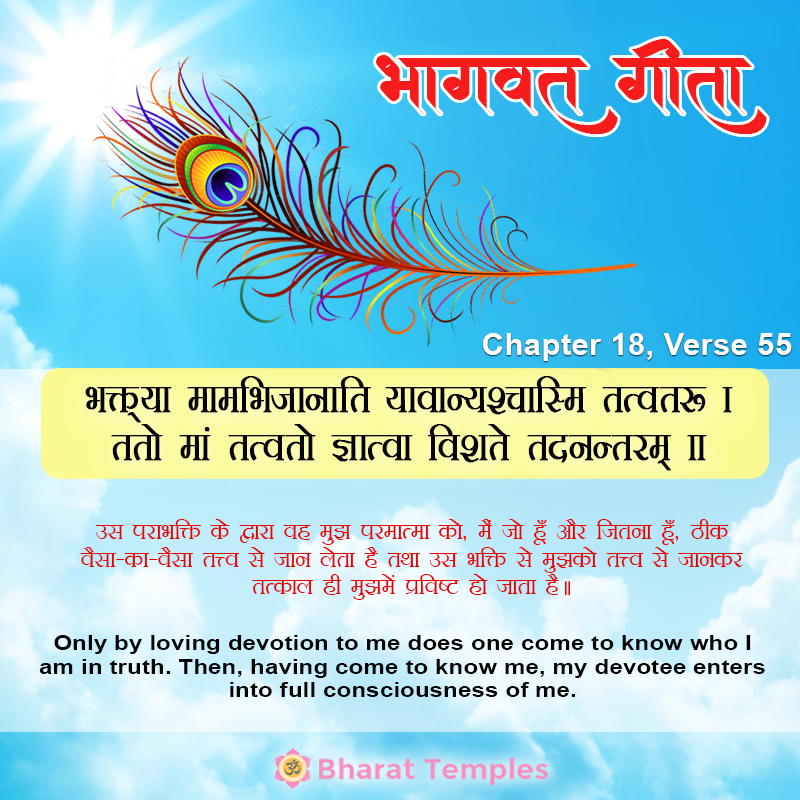Contents
भक्त्या मामभिजानाति यावान्यश्चास्मि तत्वत: |
ततो मां तत्वतो ज्ञात्वा विशते तदनन्तरम् ||
bhaktyā mām abhijānāti yāvān yaśh chāsmi tattvataḥ
tato māṁ tattvato jñātvā viśhate tad-anantaram
भावार्थ:
उस पराभक्ति के द्वारा वह मुझ परमात्मा को, मैं जो हूँ और जितना हूँ, ठीक वैसा-का-वैसा तत्त्व से जान लेता है तथा उस भक्ति से मुझको तत्त्व से जानकर तत्काल ही मुझमें प्रविष्ट हो जाता है॥55॥
Translation
Only by loving devotion to me does one come to know who I am in truth. Then, having come to know me, my devotee enters into full consciousness of me.
English Translation Of Sri Shankaracharya’s Sanskrit Commentary By Swami Gambirananda
18.55 Bhaktya, through devotion, through that devotion described as Knowledge; abhijanati, he knows; mam, Me; tattvatah, in reality; as to yavan, what I am, with the extensive differences created by limiting adjuncts; and yah asmi, who I am when all distinctions create by the limiting adjuncts are destroyed-Me who am the supreme Person comparable to space [In points of all-pervasiveness and non-attachment.] and one-without-a-second, absolute, homogeneous Consciousness, birthless, ageless, immortal, fearless and deathless.
Tatah, then; jnatva, having known; mam, Me, thus; tattvatah, in truth; visate, he enters into Me, Myself; tadanantaram, immediately after that (Knowledge). Here, by saing, ‘having known, he enters without delay’, it is not meant that the acts of ‘knowing’ and ‘entering immediately after’ are different. What then? What is meant is the absolute Knowledge itself that has to no other result, [In place of phalantarabhava-jnana-matram eva, Ast. reads ‘phalantarbhavat jnanamatram eva, absolute Knowledge itself, since there is no other result’.-Tr.] for it has been said, ‘And৷৷.understand Me to be the “Knower of the field”, (13.2).
Opponent: Has it not been contradictory to say, he knows Me through that which is the supreme steadliness (nistha) in Knowledge?
Vedantin: If it be asked, How it is contradictory?
Opponent: The answer is: Whenever any Knowledge of something arises in a knower, at that very moment the knower knows that object. Hence, he does not depend on steadfastness in Knowledge which consists in the repetition of the act of knowing. And therefore, it is contradictory to say one knows not through knowledge, but through steadfastness in knowledge which is a repetition of the act of knowing.
Vedantin: There is no such fault, since the culmination of Knowledge-which (Knowledge) is associated with the causes of its unfoldment and maturity, and which has nothing to contradict it- in the conviction that one’s own Self has been realized is what is referred to by the word nistha (consummation): When knowledge-which concerns the identity of the ‘Knower of the field’ and the supreme Self, and which remains associated with the renunciation of all actions that arise from the perception of the distinction among their accessories such as agent etc., and which unfolds from the instruction of the scriptures and teachers, depending on purity of the intellect etc. and humility etc. which are the auxiliary cuases of the origin and maturity of Knowledge-continues in the form of the conviction that one’s own Self has been realized, then that continuance is called the supreme steadfastness (nistha) in Knowledge.
This steadfastness in Knowledge that is such has been spoken of as the highest, the fourth kind of devotion in relation to the three other devotions viz of the afflicted, etc. (cf. 7.16). Through that highest devotion one realizes the Lord in truth. Immediately after that the idea of difference between the Lord and the Knower of the field vanishes totally. There-fore the statement, ‘one knows Me through devotion in the form of steadfastness in Knowledge’, is not contradictory. And, in this sense, all the scriptures-consisting of Vedanta (Upanisads etc.), History, Mythology and Smrtis-, as for instance, ‘Knowing (this very Self the Brahmanas) renounce৷৷.and lead a mendicant’s life’ (Br. 3.5.1), ‘Therefore they speak of monasticism as excellent among these austerities’ (Ma. Na. 24.1), ‘Monasticism verily became supreme’ (ibid. 21.2), which enjoin renunciation become meaningful. Thus, monasticism means renunciation of rites and duties. There are also the texts, ‘Having renounced the Vedas as well as this world and the next’ (Ap. Dh. Su. 2.9.13), and ‘Give up religion and irreligion’ (Mbh. Sa. 329.40; 331.44), etc.
And here (in the Gita) also various relevant) passages have been pointed out. In is not porper that those texts should be meaningless. Nor are they merely eulogistic, since they occur in their own contexts. Besides, Liberation consists in being established in the changeless real nature of the indwelling Self. Indeed, it is not possible that one who wants to go to the eastern sea and the other who wants to go in the opposite direction to the western sea can have the same course!
And steadfastness in Knowledg consists in being totally absorbed in maintaining a current of thought with regard to the indwelling Self. And that is opposed to coexistence with duties, like going to the western sea. It has been the conclusion of those versed in the valid means of knowledge that the difference between them is as wide as that between a mountain and a mustard seed! Therefore it is established that one should have recourse to steadfastness in Knowledge only, by relinishing all rites and duties.
The fruit of the attainment of success from the Yoga of Devotion consisting in worshiping the Lord with one’s own actions is the ability to remain steadfast in Knowledge, from which, follows stead-fastness in Knowledge, culminating in the result, Liberation. That Yoga of Devotion to the Lord is now being praised in this concluding section dealing with the purport of the Scripture, with a veiw to generating a firm conviction with regard to it (the purport of the Scripture):












